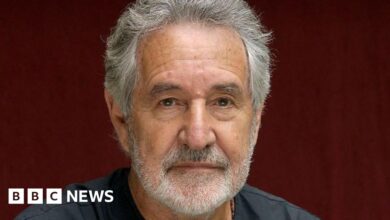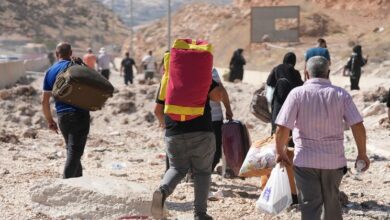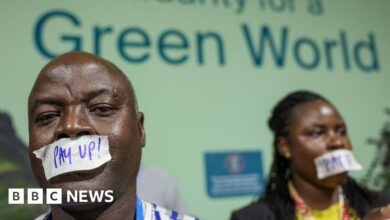Why more stars could follow Macklemore’s example
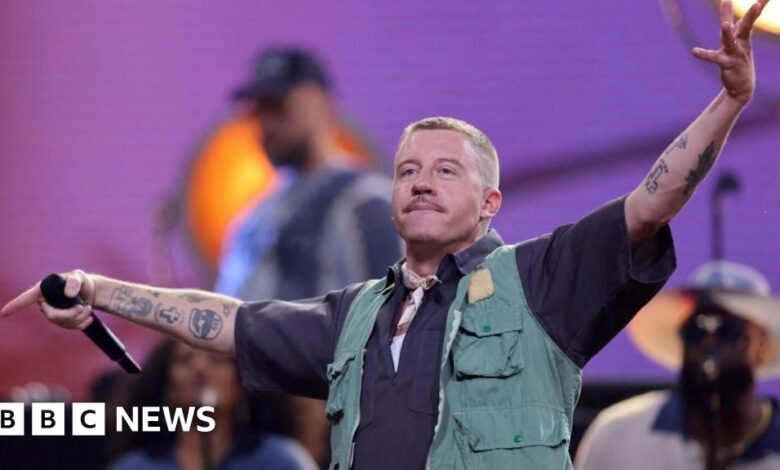
 Reuters
ReutersWhen fans saw that rapper Macklemore had canceled an upcoming performance, some assumed it was to show solidarity with Gaza.
But it wasn’t to be. The show was in Dubai and he canceled because of the war in Sudan, which has killed tens of thousands of people, left millions more starving and caused a humanitarian disaster.
The glamorous Gulf city of Dubai is the largest city in the United Arab Emirates (UAE) – which has been widely accused of funding the Rapid Support Forces (RSF), one of the warring parties in Sudan.
“The crisis in Sudan is catastrophic,” Macklemore said in an Instagram post on Monday,Some food security experts estimate that up to 2.5 million people could die from hunger and disease by October.
“I had to ask myself what my purpose as an artist was,” the rapper, best known for his 2012 hit “Thrift Shop,” added.
“If I take money, knowing it’s not in the spirit of who I am, how am I any different from the politicians I actively oppose?” Macklemore said.
His moral stance has brought the brutal conflict — which has received far less world attention than Ukraine or Gaza — into popular culture, and activists hope other artists will follow suit.
“It was huge,” said one London-based activist who has campaigned for a ceasefire. “There were a lot of people in the comments saying, ‘oh my gosh, what is going on in Sudan?’
“I think it opened people’s eyes.”
 Getty Images
Getty ImagesRSF is fighting the Sudanese army for control of the country and has been accused of sexual violence, looting and ethnic cleansing in areas it controls.
A report by Human Rights Watch said that RSF may have committed genocide against non-Arabs in a city where it is feared that 15,000 people have been killed, something the group denies.
The RSF originated from a militia, known as the Janjaweed, also charged with genocide 20 years ago in Sudan – an estimated 300,000 people died.
There is growing evidence of links between the UAE and RSF.
During the war, it was discovered that the RSF used drones, which a weapons expert from Amnesty International described as because of the “same type of drones” that the UAE has supplied to its allies in other conflicts, including in Ethiopia and Yemen.
According to a UN report to the Security Council earlier this year, experts have also seen civilian aircraft believed to be transporting weapons from the UAE to the RSF.
The accusations are that the UAE is trying to gain an economic foothold in the Red Sea and benefit from Sudan’s resources.
The RSF controls some of Sudan’s most lucrative gold mines, located in the Darfur region.
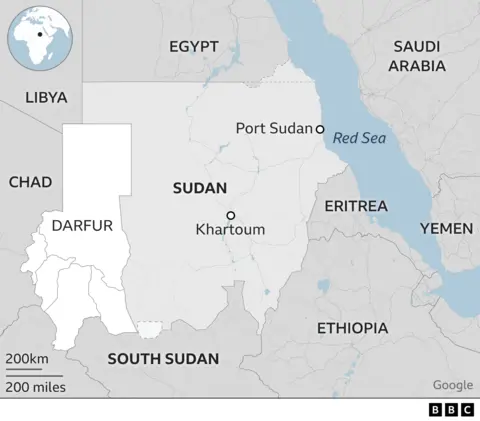
A Swiss aid organization accuses the Emiratis of being Billions of dollars of precious metals are smuggled out of Africaincluding Sudan.
And before widespread fighting erupted in the country last year, the UAE signed a $6 billion deal to build and operate a port, airport and economic zone on the country’s Red Sea coast.
The UAE government described allegations of its involvement in the conflict in Sudan as “baseless and unfounded”, and aimed at “diverting attention from the ongoing fighting and humanitarian disaster”.
“The UAE reiterates its call for an immediate ceasefire in the ongoing conflict. The warring parties must stop fighting and make efforts to find a peaceful solution to the conflict through dialogue,” the statement to the United Nations said.
Macklemore shared on Instagram that several groups have been contacting him about the Sudan crisis for months.
A representative from Madaniya, an organisation for Sudanese living in the UK, told BBC News: “A boycott by a major artist will obviously draw more attention to the Sudanese issue, which is great.
“A wonderful secondary consequence would be if more people learned about the UAE’s involvement in Sudan.”
In the coming weeks, Calvin Harris will be performing at Dubai Harbour and Sophie Ellis-Bextor will be performing at the opera house.
Neither side responded to requests for comment.
Will boycotting change anything?
Professor Alex de Waal, a Sudan expert at Tufts University in Massachusetts, said cultural and sporting boycotts could be an effective way to target regional powers accused of fomenting war.
He said the UAE and Saudi Arabia were competing for influence in Africa and were backing opposition parties in Sudan. The UAE and Saudi Arabian embassies in London did not respond to BBC requests for comment.
Professor de Waal believes Arab rivals are so economically powerful that no one can punish them – and says any such measures would be difficult to implement.
This would not be a priority for many Western countries, he added, as they were preoccupied with the Israel-Gaza war and tensions with Iran.
But he also said the UAE and Saudi Arabia were very concerned about their reputation on the international stage.
“Cultural and sporting figures saying ‘we won’t go there’ means much more than the threat of trade sanctions or financial penalties.
“I thought, it’s interesting, [threat to them] Soft power is much stronger and has much greater potential than hard power.”
Dr Crystal Murphy, an expert on East African finance based at Chapman University in California, points out towards anti-apartheid protests in South Africa which ultimately “rewrote political science and international relations.”
“The boycotts were driven by public and celebrity opposition,” she explained. [organising] and raise awareness about this issue, where many people are putting pressure on their governments.
“So that could happen,” she added. “What’s the difference between Macklemore and the South African boycotts?”
Campaigners are still a long way from achieving a boycott on that scale, but they hope Macklemore’s move will gain traction.
Madaniya’s representative described the warlords as trying to destroy the fabric of Sudanese society. But that hasn’t stopped activists. “There is always hope for the Sudanese people.”
Maybe some people have followed in Macklemore’s footsteps.
One commenter on his post said they had been invited to speak at a conference in the UAE, but now said: “Your post encouraged me to do a little more research and I decided to decline the invitation.”



